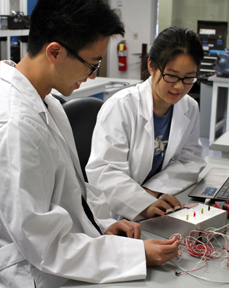Ostrow study illustrates how growth factor defect causes tongue malformation
By Beth Newcomb
New findings about how cell signaling directs tongue development may have big clinical applications for healing tongue defects, according to an Ostrow School of Dentistry of USC study in the Journal of Biological Chemistry.
Yang Chai, DDS, PhD, principal investigator of “Non-canonical transforming growth factor beta (TGFb) signaling in cranial neural crest cells causes tongue muscle developmental defects” and director of the Center for Craniofacial Molecular Biology at the Ostrow School of Dentistry, said the tongue is a unique, highly mobile muscular organ that many view as a “fifth limb.” When the tongue develops improperly or is damaged by injury or disease, it cannot regenerate on its own.
“The current standard of care is to repair the tongue surgically using a skin flap, but it doesn’t have the muscle components to move the tongue and lacks the ability to taste food,” explained Chai. “We want to understand how the tongue is formed and how we can use that knowledge to regenerate the tongue.” … Read More »


